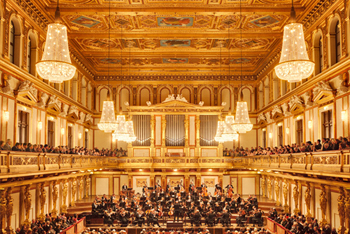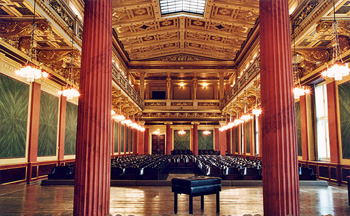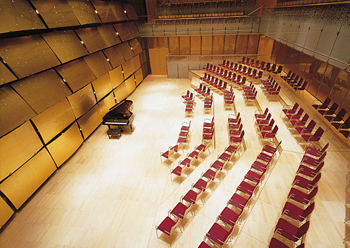Vienna Symphony Orchestra Musikverein
Mo | Tu | We | Th | Fr | Sa | Su |
The Vienna Symphony Orchestra is one of the top international orchestras. The focus of the orchestra's work is the conscious cultivation, sustainable development and broad communication of traditional Viennese sound culture. At the same time, in its more than 100-year history, the orchestra has earned a worldwide reputation for its passion for artistic innovation with premieres by leading composers, sensational artistic projects, collaborations and programs.
Program and cast
FRIDAY, SEPTEMBER 13, 2024 - 7:30 p.m.,
SATURDAY, SEPTEMBER 14, 2024 - 7:30 p.m
Vienna Symphony Orchestra
Singing club of the Society of Music Friends in Vienna
Chorus of the Vienna State Opera
Slovak Philharmonic Choir
Petr Popelka, conductor
David Butt Philip, tenor Waldemar
Vera-Lotte Boecker, soprano Tove
Sasha Cooke, mezzo-sopranoWaldtaube
Gerhard Siegel, tenor Klaus Narr
Florian Boesch, baritone farmer
Angela Denoke, spokesperson
PROGRAM
ARNOLD SCHÖNBERG
“Gurre songs” in three parts
Ends approximately 10:00 p.m
WEDNESDAY, OCTOBER 16, 2024 - 7:30 p.m.,
SATURDAY, OCTOBER 19, 2024 - 7:30 p.m
Vienna Symphony Orchestra
Elim Chan, conductor
Seong Jin Cho, piano
PROGRAM
LUDWIG VAN BEETHOVEN
Concerto for Piano and Orchestra No. 2 in B major, op. 19
- Intermission -
SERGEI VASILYEVICH RACHMANINOV
Symphony No. 2 in E minor, op. 27
Ends approximately 9:40 p.m
FRIDAY, OCTOBER 25, 2024 - 7:30 p.m.,
SUNDAY OCTOBER 27, 2024 - 7:30 p.m
Vienna Symphony Orchestra
Nathalie Stutzmann, conductor
Edgar Moreau, cello
PROGRAM
SERGEI PROKOFIEV
Symphonic concerto for cello and orchestra in E minor, op. 125
- Intermission -
DMITRI SHOSTAKOVICH
Symphony No. 5, op. 47
Ends approximately 9:30 p.m
TUESDAY, NOVEMBER 19, 2024 - 7:30 p.m.,
WEDNESDAY, NOVEMBER 20, 2024 - 7:30 p.m
Vienna Symphony Orchestra
Marie Jacquot, conductor
Maria Dueñas, violin
PROGRAM
ANTON BRUCKNER
Symphony No. 7 E major - Adagio; edited by Ferdinand Löwe
MAX BRUCH
Concerto for violin and orchestra in G minor, op. 26
- Intermission -
JOHANNES BRAHMS
Quartet for piano, violin, viola and cello No. 1 in G minor, op. 25; Set for large orchestra by Arnold Schönberg
Ends approximately 9:30 p.m
THURSDAY, DECEMBER 19, 2024 - 7:30 p.m
FRIDAY, DECEMBER 20, 2024 - 7:30 p.m
Vienna Symphony Orchestra
Cristian Măcelaru, conductor
Augustin Hadelich, violin
PROGRAM
GEORGE ENESCU
Romanian Rhapsody No. 1 A major, op. 11
PETER ILYICH TCHAIKOVSKY
Concerto for violin and orchestra in D major, op. 35
- Intermission -
ANTONÍN DVOŘÁK
Symphony No. 6 in D major, op. 60
Ends approximately 9:30 p.m
WEDNESDAY, JANUARY 15, 2025 - 7:30 p.m.,
THURSDAY, JANUARY 16, 2025 - 7:30 p.m
Vienna Symphony Orchestra
Patrick Hahn, conductor
Kian Soltani, cello
PROGRAM
MIKHAIL GLINKA
Overture to the opera “Ruslan and Ludmilla”
MARCUS NIGSCH
Concerto for Violoncello and Orchestra No. 1 (premiere - commissioned by the Society of Music Friends in Vienna and the Vienna Symphony Orchestra)
- Intermission -
PETER ILYICH TCHAIKOVSKY
Symphony No. 5 in E minor, op. 64
Ends approximately 9:30 p.m
SATURDAY, JANUARY 18, 2025 - 7:30 p.m.,
SUNDAY, JANUARY 19, 2025 - 7:30 p.m
Vienna Symphony Orchestra
Petr Popelka, conductor
Asmik Grigorian, soprano
PROGRAM
GOTTFRIED FROM ONE
Orchestral music, op. 9
RICHARD STRAUSS
Four last songs for soprano and orchestra, WoO, AV 150
- Intermission -
RICHARD STRAUSS
Cecilia, op. 27/2
Appropriation, op. 10/1
Tomorrow, op. 27/4
FRANZ SCHUBERT
Symphony No. 7 in B minor, D 759, “Unfinished”
Ends approximately 9:30 p.m
THURSDAY, FEBRUARY 20, 2025 - 7:30 p.m.,
FRIDAY, FEBRUARY 21, 2025 - 7:30 p.m
Vienna Symphony Orchestra
Robin Ticciati, conductor
Kirill Gerstein, piano
Cornelius Obonya, speaker
PROGRAM
ARNOLD SCHÖNBERG
Ode to Napoleon Buonaparte, op. 41b; Version for string orchestra, piano and speaker
LUDWIG VAN BEETHOVEN
Concerto for Piano and Orchestra No. 5 in E flat major, op. 73
- Intermission -
LUDWIG VAN BEETHOVEN
Symphony No. 3 in E flat major, op. 55, “Eroica”
Ends approximately 9:45 p.m
SATURDAY, MARCH 1, 2025 - 7:30 p.m
SUNDAY, MARCH 2, 2025 - 7:30 p.m
Vienna Symphony Orchestra
Singing club of the Society of Music Friends in Vienna
Eva Ollikainen, conductor
Noa Beinart, alto
PROGRAM
JOHANNES BRAHMS
Song of the Fates, op. 89
Song of Fate, op. 54
Rhapsody for an alto voice, male choir and orchestra, op. 53, “Alto Rhapsody”
- Intermission -
JEAN SIBELIUS
Symphony No. 5 in E flat major, op. 82
Ends approximately 9:30 p.m
WEDNESDAY, MARCH 12, 2025 - 7:30 p.m.,
THURSDAY, MARCH 13, 2025 - 7:30 p.m
Vienna Symphony Orchestra
Adam Fischer, conductor
Camilla Nylund, soprano
PROGRAM
GABRIEL URBAIN FAURÉ
Pelléas and Mélisande. Suite for orchestra, op. 80
RICHARD WAGNER
Five songs based on poems by Mathilde Wesendonck, WWV 91
- Intermission -
LUDWIG VAN BEETHOVEN
Symphony No. 6 F major, op. 68, “Sinfonia pastorale”
Ends approximately 9:30 p.m
SUNDAY, MARCH 16, 2025 - 3:30 p.m
Vienna Symphony Orchestra
Bogavox - school choirs of the BRG Vienna III
Chloé Dufresne, conductor
Sebastian Radon, moderation and singing
Bettina Büttner-Krammer, concept
Anna Doogue, concept
PROGRAM
Love is in the air - Wunderwelt Orchestra
Cooperation with the Vienna Music Association and the Vienna Symphony Orchestra
Concert for audiences aged 10 and over
SERGEI PROKOFIEV
Romeo and Juliet. Excerpts from the Ballet Suites, op. 64
GEORGES BIZET
Carmen. Suite No. 1 - Excerpts
FELIX MENDELSSOHN BARTHOLDY
Wedding March from the incidental music for William Shakespeare's “A Midsummer Night's Dream”, op. 61
PETER ILYICH TCHAIKOVSKY
Flight of the Swans from the ballet “Swan Lake”, op. 20
ELTON JOHN
Can you feel the love tonight?
JUSTIN HURWITZ
Mia & Sebastian's Theme
JOHN WILLIAMS
Princess Leia's Theme
as well as other works for orchestra and choir
Ends approximately 5:00 p.m
SATURDAY, MAY 3, 2025 - 7:30 p.m.,
SUNDAY, MAY 4, 2025 - 7:30 p.m
Vienna Symphony Orchestra
Singing club of the Society of Music Friends in Vienna
Lahav Shani, conductor
Soloist of the Vienna Boys' Choir, singing
Vikingur Olafsson, piano
PROGRAM
JOHN ADAMS
New work for piano and orchestra (Austrian premiere)
- Intermission -
LEONARD BERNSTEIN
Chichester Psalms
Symphonic Dances from “West Side Story”
Ends approximately 9:30 p.m
WEDNESDAY, MAY 14, 2025 - 7:30 p.m.,
THURSDAY, MAY 15, 2025 - 7:30 p.m
Vienna Symphony Orchestra
Alain Altinoglu, conductor
Isabelle Faust, violin
PROGRAM
MODEST PETROVICH MUSSORGSKIJ
Prelude to the opera “Khovanshchina”
DMITRI SHOSTAKOVICH
Concerto for Violin and Orchestra No. 2 in C sharp minor, op. 129
- Intermission -
CLAUDE DEBUSSY
La Mer. Three symphonic sketches for orchestra
MAURICE RAVEL
La Valse. Poème chorégraphique pour Orchestra
Ends approximately 9:30 p.m
TUESDAY, JUNE 17, 2025 - 7:30 p.m.,
WEDNESDAY, JUNE 18, 2025 - 7:30 p.m
Vienna Symphony Orchestra
Singing club of the Society of Music Friends in Vienna
Lorenzo Viotti, conductor
Christina Gansch, soprano
Rachael Wilson, mezzo-soprano
Andrew Staples, tenor
Derek Welton, bass-baritone
PROGRAM
ALEXANDER ZEMLINSKY
Spring Burial
- Intermission -
ANTON BRUCKNER
Mass in F minor
Ends approximately 9:30 p.m
SATURDAY, JUNE 21, 2025 - 7:30 p.m.,
SUNDAY JUNE 22, 2025 - 7:30 p.m
Vienna Symphony Orchestra
Manfred Honeck, conductor
Leonidas Kavakos, violin
PROGRAM
LERA AUERBACH
New work (Austrian premiere)
ERICH WOLFGANG KORNGOLD
Concerto for violin and orchestra in D major, op. 35
- Intermission -
LUDWIG VAN BEETHOVEN
Symphony No. 7 A major, op. 92
Ends approximately 10:00 p.m
Musikverein Golden Hall
This building is located on Dumbastraße/Bösendorferstraße behind the Hotel Imperial near the Ringstraße boulevard and the Wien River, between Bösendorferstraße and Karlsplatz. However, since Bösendorferstraße is a relatively small street, the building is better known as being between Karlsplatz and Kärntner Ring (part of Ringstraße loop). It was erected as the new concert hall run by the Gesellschaft der Musikfreunde, on a piece of land provided by Emperor Franz Joseph I of Austria in 1863. The plans were designed by Danish architect Theophil Hansen in the Neoclassical style of an ancient Greek temple, including a concert hall as well as a smaller chamber music hall. The building was inaugurated on 6 January, 1870. A major donor was Nikolaus Dumba whose name the Austrian government gave to one of the streets surrounding the Musikverein.
Great Hall - Golden Hall
 “As high as any expectations could be, they would still be exceeded by the first impression of the hall which displays an architectural beauty and a stylish splendour making it the only one of its kind.” This was the reaction of the press to the opening of the new Musikverein building and the first concert in the Großer Musikvereinssaal on 6 January 1870.
“As high as any expectations could be, they would still be exceeded by the first impression of the hall which displays an architectural beauty and a stylish splendour making it the only one of its kind.” This was the reaction of the press to the opening of the new Musikverein building and the first concert in the Großer Musikvereinssaal on 6 January 1870.
The impression must have been overwhelming – so overwhelming that Vienna’s leading critic, Eduard Hanslick, irritatingly brought up the question of whether this Großer Musikvereinssaal “was not too sparkling and magnificent for a concert hall”. “From all sides spring gold and colours.”
Brahms Hall
 "In order not to promise too much it can be said that it has been made into the most beautiful, most magnificent, perfect example of a chamber concert hall that any of us knows in the world.” This was the reaction of a Vienna daily newspaper in October 1993 as the Brahms-Saal was presented to the public after extensive renovation work.
"In order not to promise too much it can be said that it has been made into the most beautiful, most magnificent, perfect example of a chamber concert hall that any of us knows in the world.” This was the reaction of a Vienna daily newspaper in October 1993 as the Brahms-Saal was presented to the public after extensive renovation work.
The surprise was perfect. It was a completely new hall. In contrast to the Grosse Musikvereinssaal, the Brahms-Saal had changed its appearance quite considerably over the years. When and how it acquired that slightly melancholy duskiness that was known to music lovers before 1993 cannot be precisely documented.
Glass Hall
 As a venue for events from concerts to luxury banquets, the Glass Hall / Magna Auditorium is not only the largest of the Musikverein's 4 new halls but also the most flexible in terms of usage.
As a venue for events from concerts to luxury banquets, the Glass Hall / Magna Auditorium is not only the largest of the Musikverein's 4 new halls but also the most flexible in terms of usage.
Hub podiums enable the smooth transformation of the concert hall into a conference centre, the cinema into a ballroom, or the stage into a catwalk. State-of-the-art equipment for sound, lighting, video and widescreen digital projection provide the ideal conditions for half-scenic productions.
The Glass Hall / Magna Auditorium was designed by the Viennese architect Wilhelm Holzbauer. With a height of 8 metres, the hall (including the gallery) can play host to up to 380 visitors.

 EN
EN DE
DE IT
IT FR
FR ES
ES RU
RU JP
JP RO
RO
 Seating plan
Seating plan 



